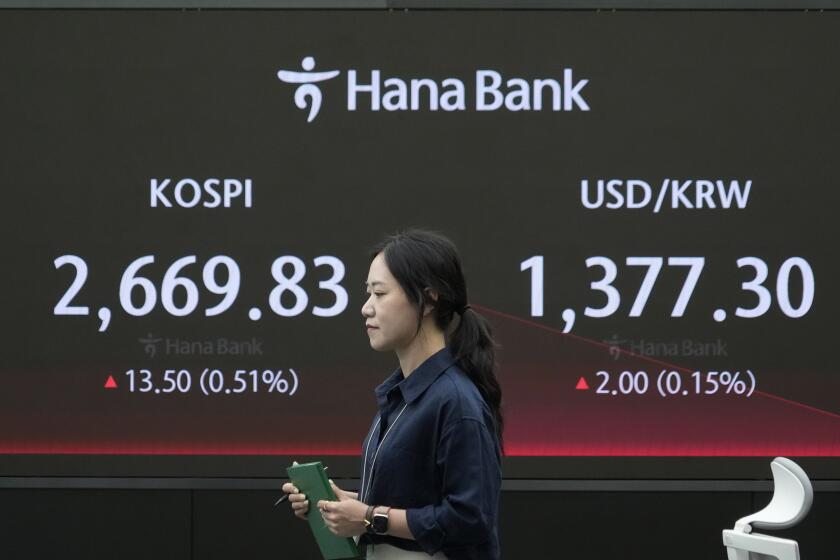Shift to Foreign Stocks Sapping the Dollar
Already depressed by the nation’s huge budget and trade deficits, the U.S. dollar is being undermined by American mutual fund investors: More of them are funneling money into foreign stock funds, a shift that hurts the greenback.
Thanks in large part to the dollar’s weakness, returns on foreign shares overall have significantly outpaced U.S. market returns since 2002. Foreign stock mutual funds have gained 12% a year, on average, over the last three years, compared with a 4.9% average annual gain for domestic stock funds, according to Morningstar Inc.
That performance edge is proving a big draw for American investors this year.
Net U.S. cash inflows to stock funds that invest overseas soared to a record $79.7 billion in the first 10 months, compared with $47.6 billion for all of 2003, according to estimates from fund tracker Financial Research Corp. in Boston.
A list of the 25 best-selling stock and bond mutual funds of 2004 includes five that primarily invest in foreign securities, Financial Research data show. By contrast, the 25 best-selling funds at this point last year all were domestic portfolios.
For financial advisors, investors’ growing interest in foreign securities is a welcome change from the 1990s, when many found it difficult to get clients to diversify away from the then-hot U.S. market.
“They would say, ‘Tell me again why I should be in foreign stocks,’ ” said Craig T. Cross, co-founder of investment advisory firm Halbert Hargrove in Long Beach.
Now, Cross said, “more and more clients” are asking about foreign investing.
That could add to the downward pressure on the U.S. currency’s value against the euro, the yen and other major currencies. By investing more in foreign mutual funds, Americans in effect are selling dollars in favor of other currencies.
On their own, those cash flows aren’t big enough to make or break the buck, experts say. Still, “they raise the hurdle for the dollar that much higher,” said Daniel Katzive, a currency strategist at brokerage firm UBS in Stamford, Conn.
But a weaker dollar is exactly what many investors are betting on. As its value slides, foreign securities can automatically be worth more to U.S. investors.
To illustrate: When one euro was worth 86 U.S. cents in 2002, a European stock priced at 10 euros was worth $8.60 to a U.S. investor. Now, one euro is worth about $1.33. Even if that European stock is still worth just 10 euros in its home market, its value to a U.S. investor is $13.30 -- 55% more than in 2002.
And if foreign stock prices rally in their native currencies, that plus the currency effect can provide hefty returns for American investors when the dollar is falling.
This year, for example, the main blue-chip German stock index, the DAX, is up a modest 5.5% in euro terms. But with the euro’s appreciation against the dollar, the DAX’s return for a U.S. investor is 11.4% -- compared with a 7.4% price gain for the U.S. blue-chip Standard & Poor’s 500 index.
The currency bonus has been even bigger this year for U.S. owners of shares traded in some smaller markets, including Poland, South Korea, New Zealand and South Africa.
Among broadly diversified stock mutual funds, the EuroPacific Growth fund, managed by Los Angeles-based American Funds group, has gained 15.4% for its investors this year. That compares with a 10.1% return for the average domestic stock fund, according to Morningstar.
The EuroPacific fund is the ninth-best-selling mutual fund this year. It took in a net $5.6 billion in new cash in the first 10 months, helping to lift its assets to nearly $50 billion, according to Financial Research.
By contrast, the $103-billion Vanguard 500 Index fund, which tracks the S&P; 500, took in $3 billion in the first 10 months.
Also popular this year are so-called exchange-traded funds that invest abroad. ETFs are portfolios of stocks, similar to conventional mutual funds, but trade on the New York or American stock exchanges.
The iShares MSCI-EAFE fund, which trades on the American Stock Exchange, tracks the broad-based Morgan Stanley Capital International index of European, Australasian and Far Eastern stocks. The fund’s price was $156.40 a share on Friday, up 14.3% since the start of the year.
Assets in foreign-stock ETFs now total $30.4 billion, more than double the $13.9 billion they held at the end of last year. Domestic-stock ETF assets have risen 31% in the same period, to $173.4 billion, according to the Investment Company Institute, the main trade group for mutual funds.
Yet as interest in foreign shares booms, market professionals caution investors about being seduced by recent returns.
“You’re making a lot of bets when you buy a foreign stock fund,” said Russ Kinnel, director of fund analysis at Morningstar in Chicago.
One obvious risk is that the dollar could suddenly strengthen. That would penalize American investors by shrinking the value of their foreign shares when translated from weaker currencies to dollars.
Many currency experts and investment strategists say the fundamental issues weighing on the dollar -- including the nation’s budget and trade deficits, and the risk that they will get bigger before they get smaller -- make it more likely that the greenback is headed lower.
“Our view is that the dollar will keep falling in 2005,” said Rebecca Patterson, a currency strategist at J.P. Morgan Chase & Co. in New York. She expects the euro to reach $1.38 next year and the dollar to fall to 94 yen, from about 104 yen now.
Even so, market pros concede that predicting currency trends is a dicey business.
Political risks also are a factor in foreign investing, particularly in funds that buy shares of companies in the developing world. For example, a political coup in one developing country could shake confidence in many others.
More worrisome, some experts say, is that a continuing decline in the dollar against the euro and the yen could trigger recessions in Europe and Japan by depressing demand for their exports. A weaker dollar makes foreign goods more expensive for U.S. consumers, and U.S. goods cheaper abroad.
If the net effect of a falling dollar was to cause recessions abroad, the declines in foreign stock markets might far exceed any benefit Americans accrue from the currency factor.
Kinnel and other advisors say the best reason to invest overseas is to provide a portfolio with broader diversification, long term, than U.S. securities alone can provide. In a mostly capitalist world, the U.S. has no monopoly on growth businesses, analysts note.
“Just going into a foreign fund because you think the dollar is going to go down for six months is a bad idea,” Kinnel said. “You’ve got to go in for the right reason, which is diversification.”
Rick Keller, a principal at the Keller Group Investment Management in Irvine, said he typically keeps about 20% of clients’ total stock assets invested in foreign funds. He said he had anticipated that the dollar would weaken in the last few years but that the slide had exceeded his expectations.
Nonetheless, Keller said he remained bullish on foreign markets, and believed he could justify raising some clients’ foreign-stock assets to 30% of their total in equities.
Considering the potential returns from stock price appreciation and the currency factor, “I’m probably still more optimistic on our foreign-stock allocation than on our U.S. allocation,” he said.






